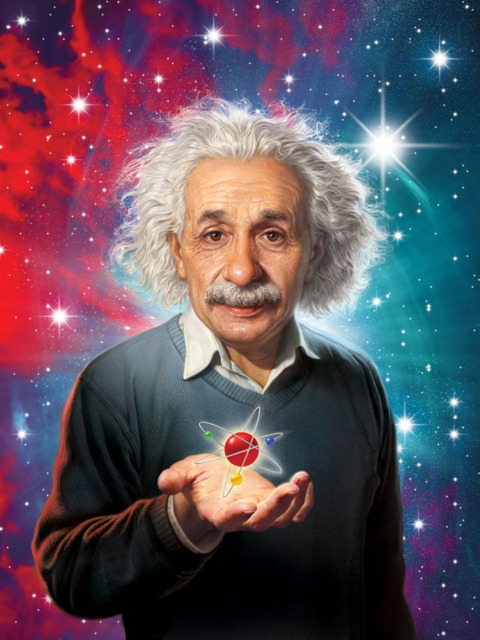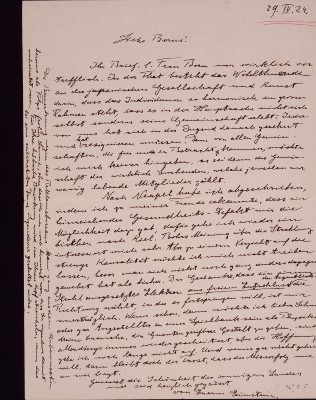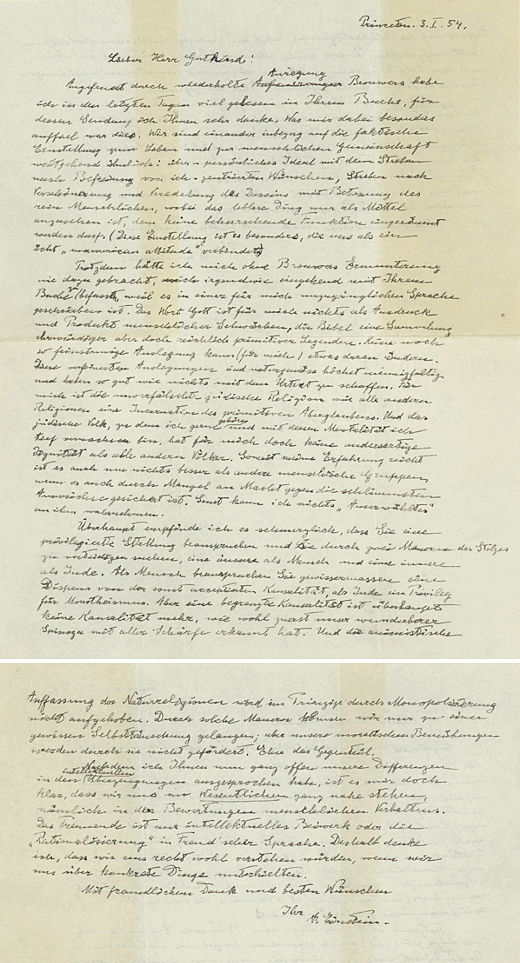A Rare collection of the letters shows a fearful Einstein long before the Nazi’s attack.
Prague, 23 November 1911
Esteemed Mrs. Curie,
Don’t laugh at me for writing to you without having anything sensible to say. But I’m so furious at the vile [niederträchige] way in which the rabble [Pöbel] at present dares to treat you that I absolutely must give vent to this feeling. I am, however, convinced that you despise this rabble, equally when it’s feigning adoration or when it’s using you to slake its thirst for the sensational! I must tell you how much I’ve come to admire your spirit [Geist], your creativity, and your honesty. I consider myself lucky to have
made your personal acquaintance in Brussels. Anyone other than those reptiles is certainly happy, now as before, that we have eminent people like you, and also Langevin, among us—real people [wirkliche Menschen] with whom one feels privileged to be in contact. If the rabble continues to occupy itself with you, then simply don’t read that swill. Rather leave it to the reptile for whom it’s been fabricated.
With most friendly regards to you, Langevin, and [Jean] Perrin,
Yours very truly,
A. Einstein
P.S. I’ve determined the statistical law of [rotational] motion for a diatomic molecule in Planck’s radiation field by means of a merry joke [lustigen Witz], of course on the assumption that the structure’s motion obeys the laws of ordinary mechanics. But I have little hope that this law is valid in reality.

Princeton, 15 September 1950
Dear Born,
… People such as your Bolshevik doctor come by their fantastic attitude as a result of their objection to the harshness, injustice, and absurdity of our own social order (escape from reality). If he happened to be living in Russia, no doubt he would be a rebel there as well, only in that case he would take care not to tell you about it. Nevertheless, it seems to me that our own people here [in the US] make an even worse job of their foreign policy than the Russians. And the idiotic public can be talked into anything. And they really are very shortsighted, for technological superiority is transitory, and if it comes to all-out conflict, the decisive factor is sheer numerical superiority.
There is nothing analogous in relativity to what I call incompleteness of description in the quantum theory. Briefly, it is because the ψ-function is incapable of describing certain qualities of an individual system, whose “reality” none of us doubt (such as a microscopic parameter). Take a (macroscopic) body that can rotate freely about an axis. Its state is fully determined by an angle. Let the initial conditions (angle and angular momentum) be defined as precisely as the quantum theory allows. The Schrödinger equation then gives the ψ-function for any subsequent time interval. If this is sufficiently large, all angles become (in practice) equally probable. But if an observation is made (e.g. by flashing a torch), a definite angle is found (with sufficient accuracy). This does not prove that the angle had a definite value before it was observed—but we believe this to be the case because we are committed to the requirements of reality on the macroscopic scale. Thus, the ψ-function does not express the real state of affairs perfectly in this case. This is what I call “incomplete description.”
So far, you may not object. But you will probably take the position that a complete description would be useless because there is no mathematical relationship for such a case. I do not say that I am able to disprove this view. But my instinct tells me that a complete formulation of the relationships is tied up with a complete description of its factual state. I am convinced of this although, up to now, success is against it. I also believe that the current formulation is true in the same sense as e.g. thermodynamics, i.e. as far as the concepts used are inadequate. I do not expect to convince you, or anybody else. I just want you to understand the way I think.
I see from … your letter that you, too, take the quantum theoretical description as incomplete (referring to an ensemble). But you are, after all, convinced that no (complete) laws exist for a complete description, according to the positivistic maxim: Esse est percipi [to be is to bperceived]. Well, this is a programmatic attitude, not knowledge. This is where our attitudes really differ. For the time being, I am alone in my views—as Leibniz was with respect to the absolute space of Newton’s theory.
… I have not changed my attitude to the Germans, which, by the way, dates not just from the Nazi period. All human beings are more or less the same from birth. The Germans, however, have a far more dangerous tradition than any of the other so-called civilized nations.
Kind regards,
Yours,
A. E.
Berlin, 29 April 1924
Dear Borns,
Your letter, dear Mrs. Born, was really excellent. Indeed, what causes the sense of well-being inspired by Japanese society and art is that the individual is so harmoniously integrated into his wider environment that he derives his experiences not from the self, but mainly from the
… Bohr’s opinion about radiation is of great interest. But I should not want to be forced into abandoning strict causality without defending it more strongly than I have so far. I find the idea quite intolerable that an electron exposed to radiation should choose, of its own free will, not only its
With best wishes.
Yours
Einstein
Oxford, 30 May 1933
Dear Born,
… I am glad that [you and James Franck] have resigned your positions. Thank God there is no risk involved for either of you. But my heart aches at the thought of the young ones…. I hear that the establishment of a good Institute of Physics in Palestine (Jerusalem) is at present being considered.
There has been a nasty mess there up to now, complete charlatanism. But if I get the impression that this business could be taken seriously, I shall write to you at once with further details. For it would be splendid if something good were to be created there….
Two years ago I tried to appeal to Rockefeller’s conscience about the absurd method of allocating grants, unfortunately without success. Bohr has now gone to see him in an attempt to persuade him to take some action on behalf of the exiled German scientists…. I am firmly convinced that those who have made a name already will be taken care of. But the others, the young ones, will not have the chance to develop.
You know, I think, that I have never had a particularly favorable opinion of the Germans (morally and politically speaking). But I must confess that the degree of their brutality and cowardice came as something of a surprise to me. I originally intended to create a university for exiles. But it soon became apparent that there are insurmountable obstacles, and that any effort in this direction would impede the exertions of individual countries.
Yours,
Einstein
To his daughter
“When I proposed the theory of relativity, very few understood me, and what I will reveal now to transmit to mankind will also collide with the misunderstanding and prejudice in the world. I ask you to guard the letters as long as necessary, years, decades until society is advanced enough to
accept what I will explain below.
There is an extremely powerful force that, so far, science has not found a formal explanation too. It is a force that includes and governs all others, and is even behind any phenomenon operating in the universe and has not yet been identified by us. This universal force is LOVE. When scientists looked for a unified theory of the universe they forgot the most powerful unseen force.
Love is Light, that enlightens those who give and receive it. Love is gravity because it makes some people feel attracted to others. Love is power,
This force explains everything and gives meaning to life. This is the variable that we have ignored for too long, maybe because we are afraid of love because it is the only energy in the universe that man has not learned to drive at will.
To give visibility to love, I made a simple substitution in my most famous equation. If instead of E = mc2, we accept that the energy to heal the world can be obtained through love multiplied by the speed of light squared, we arrive at the conclusion that love is the most powerful force there is
If we want our species to survive, if we are to find meaning in life, if we want to save the world and every sentient being that inhabits it, love is the one and only answer. Perhaps we are not yet ready to make a bomb of love, a device powerful enough to entirely destroy the hate, selfishness, and greed that devastated the planet. However, each individual carries within them a small but powerful generator of love whose energy is waiting to be released.
When we learn to give and receive this universal energy, dear Lieserl, we will have affirmed that love conquers all, is able to transcend everything and anything, because love is the quintessence of life. I deeply regret not having been able to express what is in my heart, which has quietly beaten for you all my life. Maybe it’s too late to apologize, but as time is relative, I need to tell you that I love you and thanks to you I have reached the ultimate answer! “.
Your father,
Albert Einstein
Princeton, 3. 1. 1954
Dear Mr. Gutkind,
Inspired by Brouwer’s repeated suggestion, I read a great deal in your book, and thank you very much for lending it to me. What struck me was this: with regard to the factual attitude to life and to the human community we have a great deal in common. Your personal ideal with its striving for freedom from ego-oriented desires, for making life beautiful and noble, with an emphasis on the purely human element. This unites us as having an “unAmerican attitude.”
Still, without Brouwer’s suggestion, I would never have gotten myself to engage intensively with your book because it is written in a language inaccessible to me. The word God is for me nothing more than the expression and product of human weakness, the Bible a collection of honorable, but still purely primitive, legends which are nevertheless pretty childish. No interpretation, no matter how subtle, can change this for me. For me, the Jewish religion like all other religions is an incarnation of the most childish superstition. And the Jewish people to whom I gladly belong, and whose thinking I have a deep affinity for, have no different quality for me than all other people. As far as my experience goes, they are
also no better than other human groups, although they are protected from the worst cancers by a lack of power.
In general, I find it painful that you claim a privileged position and try to defend it by two walls of pride, an external one as a man and an internal one as a Jew. As a man you claim, so to speak, a dispensation from causality otherwise accepted, as a Jew the privilege of monotheism. But a limited causality is no longer a causality at all, as our wonderful Spinoza
monopolization. With such walls, we can only attain a certain self-deception, but our moral efforts are not furthered by them. On the contrary. Now that I have quite openly stated our differences in intellectual
With friendly thanks and best wishes,
Yours,
A. Einstein
Albert Einstein
Old Grove Rd.
Nassau Point
Peconic, Long Island
August 2nd, 1939
F.D. Roosevelt
President of the United States
White House
Washington, D.C.
Sir:
Some recent work by E.Fermi and L. Szilard, which has been communicated to me in manuscript, leads me to expect that the element uranium may be turned into a new and important source of energy in the immediate future. Certain aspects of the situation which has arisen seem to call for watchfulness and, if necessary, quick action on the part of the Administration. I believe therefore that it is my duty to bring to your att-ention the following facts and recommendations:
In the course of the last four months it has been made probable – through the work of Joliot in France as well as Fermi and Szilard in America – that it may become possible to set up a nuclear chain reaction in a large mass of uranium by which vast amounts of power and large quantities of new radium-like elements would be generated. Now it appears almost certain that this could be achieved in the immediate future. This new phenomenon would also lead to the construction of bombs, and it is conceivable – though much less certain – that extremely powerful bombs of a new type may thus be constructed. A single bomb of this type, carried by boat and exploded in a port, might very well destroy the whole port together with some of the surrounding territory. However, such bombs might very well prove to be too heavy for transportation by air.
The United States has only very poor ores of uranium in moderate quantities. There is some good ore in Canada and former Czechoslovakia, while the most important source of uranium is Belgian Congo.
In view of the situation, you may think it desirable to have more permanent contact maintained between the Administration and the group of physicists working on chain reactions in America. One possible way of achieving this might be for you to entrust with this task a person who has your confidence and who could perhaps serve in an unofficial capacity. His task might comprise the following:
a) to approach Government Departments, keep them informed of the further development, and put forward recommendations for Government action, giving particular attention to the problem of securing a supply of uranium ore for the United States;
b) to speed up the experimental work, which is at present being carried on within the limits of the budgets of University laboratories, by providing funds, if such funds are required, through his contacts with private persons who are willing to make contributions for this cause, and perhaps also by obtaining the co-operation of industrial laboratories which have the necessary equipment.
I understand that Germany has actually stopped the sale of uranium from the Czechoslovakian mines which she has taken over. That she should have taken such early action might perhaps be understood on the ground that the son of the German Under-Secretary of State, von Weizsäcker, is attached to the Kaiser-Wilhelm-Institut in Berlin where some of the American work on uranium is now being repeated.
Yours very truly,
Albert Einstein
On his love affairs:
Despite declaring in one letter that ”I must seek in the stars what was denied to me on earth,”
A letter to his wife Elsa reads: ”Mrs. M. definitely acted according to the best Christian-Jewish ethics: 1)one should do what one enjoys and what won’t harm anyone else; and 2) one should refrain from doing things one does not take delight in and which annoy another person. Because of 1) she came with me,
and because of 2) she didn’t tell you a word. Isn’t that irreproachable?”
In a letter to his stepdaughter, Margot, in 1931, Einstein confides in her, ”It is true that Mrs. M. followed me [to England] and her chasing after me is getting out of control…”
On his step-daughter: In a letter to Elsa in 1924, Einstein tells her, ”I love her [Margot] as much as if she were my own daughter, perhaps even more so, since who knows what kind of brat she would have become [had I
fathered her].” On relativity:
In a letter to Elsa in 1921, he admits, ”Soon I’ll be fed up with the relativity. Even such a thing fades away when one is too involved with it…”





![Einstein wrote a letter to the
[then] President Roosevelt.](https://i0.wp.com/scientiamag.org/wp-content/uploads/2019/03/letter-to-roosevelt.png?fit=640%2C376&ssl=1)

